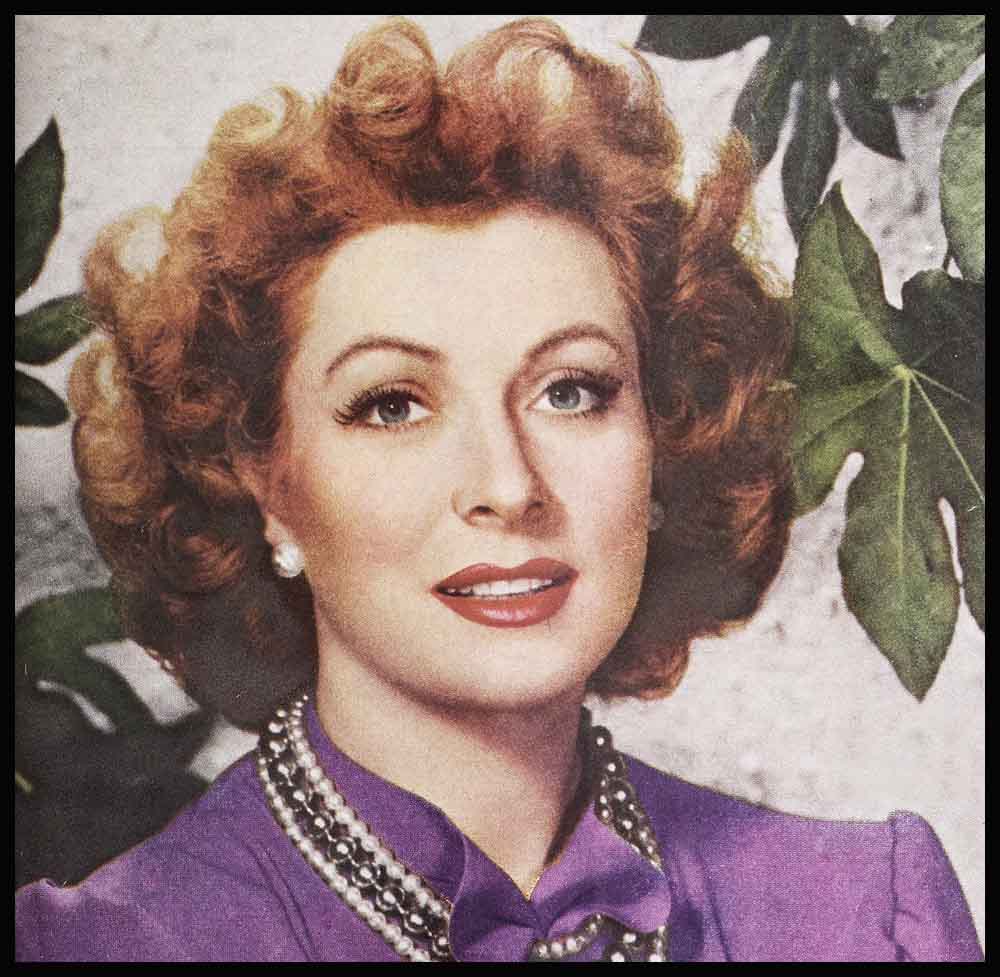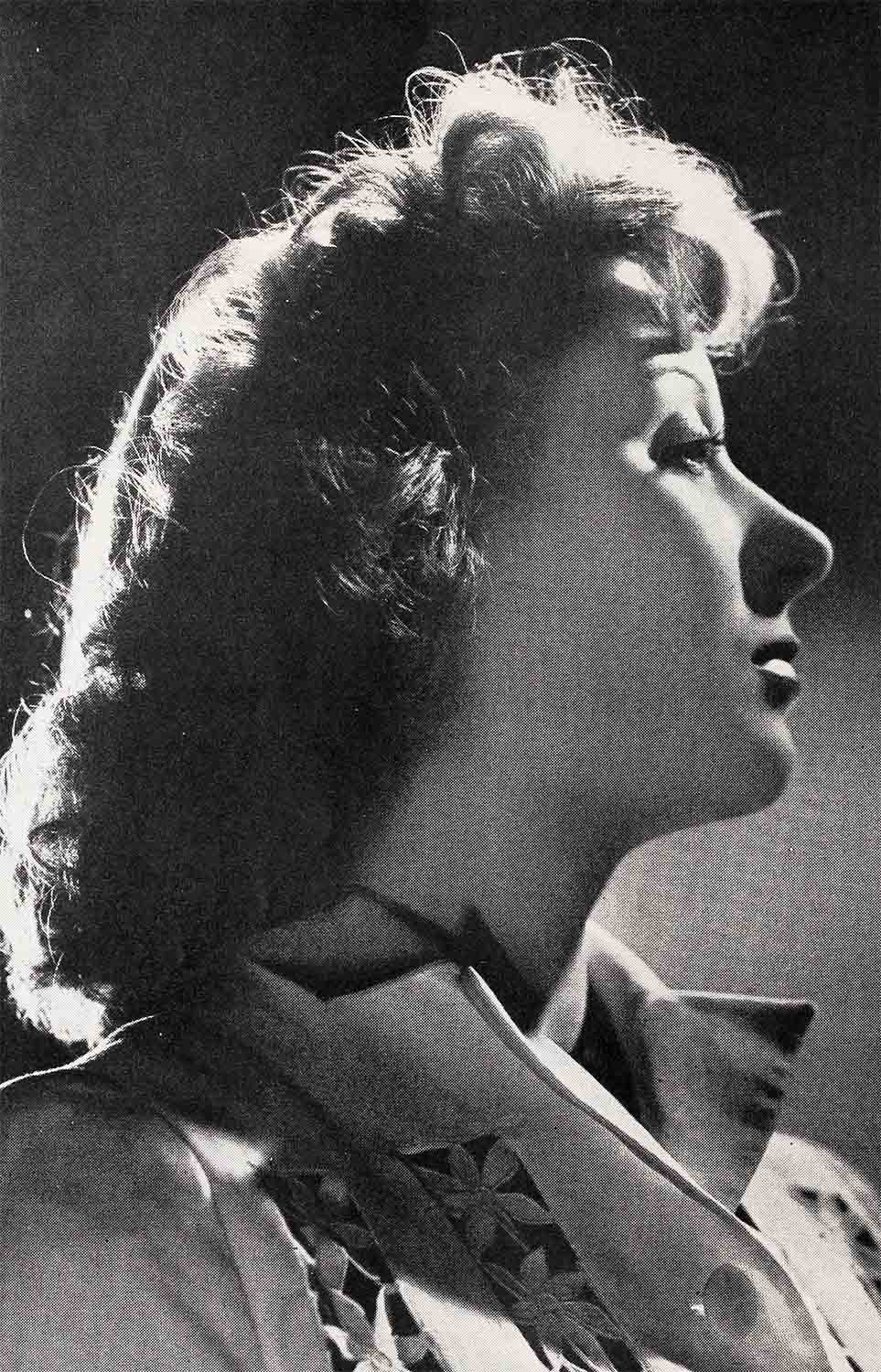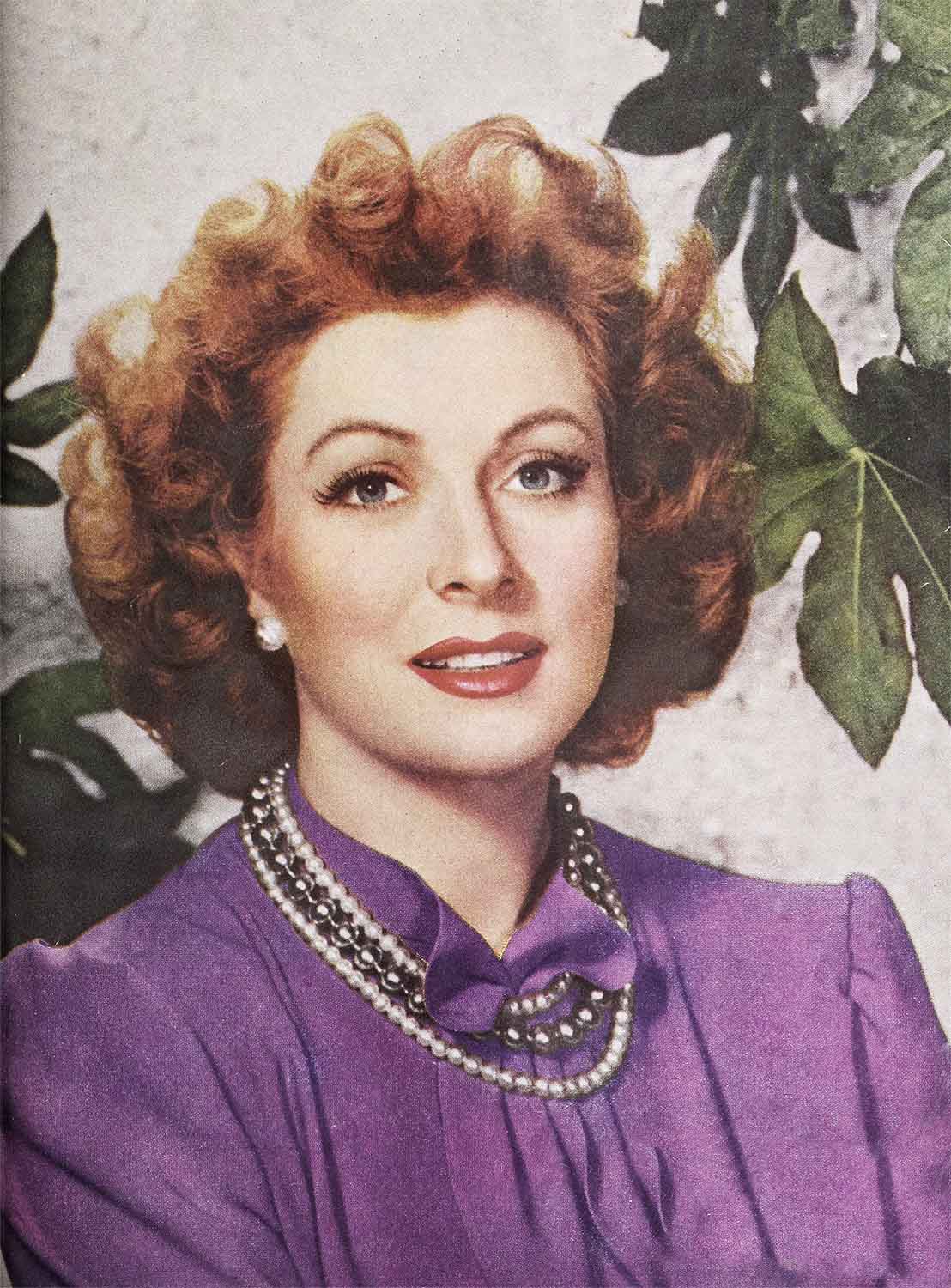
Gold Medal Lady; Greer Garson
Greer Garson, Photoplay’s Gold Medal Lady, reminds me of a duchess. Not that she looks like one. More often than not duchesses aren’t at all regal like Greer but are women with bad figures and terrible clothes. I think of Greer as a duchess because usually only someone as sure of herself as a duchess is as much fun, as gay, as amusing and daring.
At a party I gave recently Greer, Artur Rubinstein, the pianist, and Lauritz Melchior, the Metropolitan tenor, pretended to orchestrate Wagner. Greer was a trombonist. It was one of the funniest things I have ever seen. Greer’s hair became rumpled and her gown was awry. But, devoid of any pretensions of elegance, she isn’t given to worrying about such unimportant things. Consequently, she’s more fun than most women I know.
AUDIO BOOK
Back in 1940—before Greer was well established in Hollywood—we worked together in the theater. A group of us—Doug Fairbanks Jr., Roland Young, Ida Lupino, C. Aubrey Smith (now Sir Aubrey), John Loder, Rita Hayworth, Brian Aherne, Joan Fontaine, Edmund Gwenn and Constance Bennett—got together to give our Services in Noel Coward’s series of little plays collectively known as “Tonight At Eight-Thirty.” We were not in the war at this time but felt very keenly about Great Britain and, through our six-weeks engagement at El Capitan Theater, finally contributed over twenty-five thousand dollars to the British War Relief.
Greer and Brian and I played in “Ways And Means.” Greer was an adventuress. Brian was her husband. The entire action took place in a bedroom of a Mediterranean villa with Greer and Brian reclining in twin beds. I was the hostess.
During rehearsals Greer was kind enough to make little suggestions that helped my performance immeasurably. For instance, she said: “Elsa, when you stoop to pick up anything from the floor why don’t you turn your back to the audience?” Since my figure is one that always is very much in evidence this proved an excellent bit of business which brought howls from the audience throughout our run.
It is not by fortunate chance that Greer Garson is one of Hollywood’s first ladies today or that, the American public, through the Photoplay poll, directed by Dr. Gallup, has voted her the most popular actress of 1944. Greer worked hard for her high place. Only a long apprenticeship, I think, makes it possible for any actress to give such charmingly convincing portrayals as those which have marked her in pictures like “Goodbye, Mr. Chips,” “Blossoms In The Dust,” “Mrs. Miniver,” “Random Harvest” and “Mrs. Parkington.”
In England, far from being a great star, Greer was a member of a touring company. She played in industrial cities like Manchester and Liverpool and in smaller cities and towns in Ireland and Scotland. Members of such touring companies live simply and are hard put to it to make ends meet. When they get into a town they are quartered in lodgings which cost about one pound (less than five dollars) a week. These lodgings are described literally enough as “bed and breakfast.” The quality of both bed and breakfast seldom varies. It is poor.
However, had Greer not grown up professionally in this hard way she might never have impressed Louis B. Mayer that night in London when he dropped in to see a mediocre play, spied her in a small role and was instantly convinced she might become a great star.

Not that the race was won for Greer that night by any m means. When she appeared as Mrs. Chips in “Goodbye, Mr. Chips” the critics penned good notices and the more discriminating among her audiences remembered a human performance by an actress they did not know, who wasn’t too glamorous by the ordinary standards. After which Greer remained idle and watched the Garbos and Crawfords and Hepburns walk off with the very roles upon which she had set her heart. It was not easy for her during that first long, lonely, idle year. She was British and strange to our ways. She neither danced nor sang nor posed for leg art—so both her opportunities and her publicity were limited. The fact that her mother, a very pretty woman with pink cheeks and white hair, was with her proved her salvation. “During that disappointing and disillusioning and humiliating period,” Greer said, “it was my mother who kept me alive.”
It was, I think, the deep hurt Greer knew at this time that resulted in her engagement to an important producer. She found his admiration and adoration warming. But whenever the question of marriage arose one or both of them hesitated. Perhaps he knew that at this point Greer first sought the career—just beginning—for which she had waited so long.
The other day when I lunched with Greer this producer also was with us. And although his heart, like Greer’s, now belongs to another, it is evident they enjoy such a friendship as a man and woman are rarely able to salvage from a broken engagement.
Katharine Hepburn called upon Greer that day too. We were regaling each other with reminiscences of our days together in the Noel Coward plays when there was a knock at the door and Katie asked, “May I come in?”
“Of course!” called Greer. She has the lilt in her voice that blesses those with natural gaiety. Whereupon Katie, looking delightful and sweet in old slacks—you tell me how she does it—joined us for dessert and coffee.
May I come in? That request from Katie Hepburn in itself shows Greer’s position. Stars aren’t given to calling on each other at the studio. Katie especially. However, she adores Greer and Greer adores her.
“I’d love to do musical comedy,” Greer told me that day after Katie and the producer had left and we sat talking. “On the stage or in pictures—preferably in pictures . . . Much as I long to do a stage play I’ll admit I get a little frightened at the thought of returning to the theater.
“And I suppose it’s sheer nonsense for me to think about a musical anyway. I’m not a dancer. . . .”
I laughed. That very morning on the set of “Valley Of Decision” Greer, playing a little urchin, had done the best kick and tap step I have ever seen. She’s wonderfully facile, instantly responsive to anything that goes on around her. If she had music and dancing on her set she would be right in there holding her own.

Greer’s dressing room is in Star’s Row, very definitely top of the walk and red-velvet-carpeted. It is here that the biggest Metro stars have their beautiful little houses which comprise sitting room, bedroom and bath. Greer’s little house features the greens that are so becoming to her and boasts every manner of contrivance including a radio and steam bath.
Looking about this dressing-room house I’m sure Greer thinks to herself, “Can this be I?” For while she hoped for moderate success in America I doubt she ever dreamed of the wealth, fame and honor that is hers today.
I’m also sure she never dared dream she would be as happy as she is today—loved by and in love with Richard Ney whom she so fondly calls “my long-legged husband.” If she were a pretentious person, if she didn’t have a full sense of values, if she didn’t remember her life in the English theater and realize that there but for the grace of God and the perspicacity of Louis B. Mayer she might be still, she probably would have avoided Richard Ney when she first found him attractive. She might very well have felt this young man, headed for war and possessed of no such name as she had on the screen, would not be a suitable husband for her. However, she did nothing of the kind. She knew he was in love with her. And she allowed herself to fall in love with him. She had not gotten ahead in pictures by being played as a favorite. She had earned her way, proved her worth. She was in a position to marry whom she wished, when and how. And with all her heart she wished to marry Richard.
Last summer when Richard was home on furlough it was great to see him and Greer together. They have the same wonderful humor about everything, including themselves. They have the same gift for enjoying whatever comes their way whether it be tea at a little stand at the beach or a great symphony. It is downright exciting to see them laughing and loving and playing together.
Greer rarely talks about Richard in the war. It’s only occasionally she says anything to tell you how deeply she feels his absence or how eternally concerned she is for his safety. Recently, when the headlines told of daring Naval activity in the Pacific, Greer’s face grew a little sad as she said, “My Richard was in danger.”
I told her, “Our Navy’s good, Greer!”
She smiled. “I know it is! Anyway I’m glad my husband’s a sailor! I come from a sailor country!”
Now that Douglas MacArthur and his splendid fighting men have made Manila ours again she plans to go there. She knows it is the only way she will see Richard again for a long time.
“Elsa,” Greer said to me the other day, apropos of nothing except things she must have been thinking a lot about, “you’ve always worked hard. But you’ve always had fun too. That’s important! Before I get very old I want to take time off and have fun. . .”
“I don’t think you’ll have the slightest obstacle placed in your way,” I assured her. “Your boss, Louis B. Mayer, is a very understanding man and very kind to his stars—because he loves them. In fact, I think he’s one of the few big producers who does love those who work for him. You’ve made good—completely. I know he will arrange your schedule so you can have whatever free time you wish.”
Eagerly she said, “I’ll come to New York when I’ve finished this picture and we’ll have fun together, you and I. You’ll be in New York then, Elsa . . . That will be only a short holiday, of course. I’ll need a longer one when I go to Manila. And a still longer one when the war’s over—and Richard and I can go away together.”
I suspect she wants to show Richard her native England. Everything that’s important to them, everything they’ve ever enjoyed, they want to share.
Here’s to Photoplay’s lovely Gold Medal Lady! And here’s to her long-legged husband. If possible he will be even prouder than she is of the beautiful medal in its velvet case which stands on the long table in the Ney drawing room, shining in the sunshine that pours in through the long mullioned windows and symbolizing the American public’s choice of Greer Garson as the most popular actress of 1944.
THE END
It is a quote. PHOTOPLAY MAGAZINE MAY 1945
AUDIO BOOK




